|
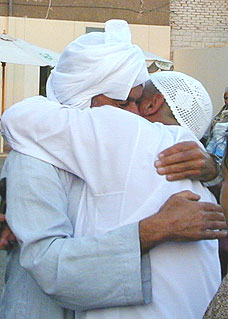
Home
from the hajj
Thousands of
Egyptian pilgrims came home safely from Mecca this week. Cairolive was
there with the crowds
Photos and text by Tarek Atia
(cairolive.com, February 27, 2002) Sunset,
Cairo International Airport -- Terminal Three: Thousands
of Egyptian pilgrims are returning from the hajj at Mecca. The scene is
festive just outside the arrival hall, with relatives of the pilgrims
waiting patiently for their loved ones to return from the spiritual, and
potentially dangerous, journey. This year there were no incidents to mar
the glory of the event, where two million Muslims of every color and
kind converge on the ka'ba in Mecca.
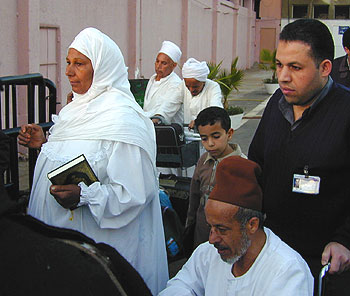 "Are
they going to announce the names of the passengers like they did last
year," one man asks another. "That was a very nice thing they
did." "Are
they going to announce the names of the passengers like they did last
year," one man asks another. "That was a very nice thing they
did."
Sure enough just a
few moments later, an announcer's voice comes through on the speakers
that have been set up here. "Flight 7035 has arrived from Jedda.
Its passengers are..." The announcer proceeds to list everyone on
the plane so that the relatives waiting outside will know whether their
friends and family have arrived.
There are planes
arriving nearly every half hour. A total of 4000 Egyptian pilgrims will
be coming home in the next few days on dozens of flights. Thousands more
will be arriving by ship and bus over the next few weeks.
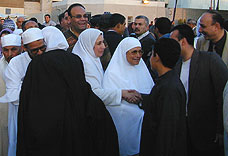 A
Sa'idi mizmar and drum troupe is circling the parking area and arrival
hall playing victory music to welcome the pilgrims home. Their sounds
intermingle with the ecstatic ululations of women young and old
celebrating the arrival of their loved ones. A
Sa'idi mizmar and drum troupe is circling the parking area and arrival
hall playing victory music to welcome the pilgrims home. Their sounds
intermingle with the ecstatic ululations of women young and old
celebrating the arrival of their loved ones.
These friends and
relatives are different people -- they are to be called Hajj or Hajja
now.
But there are
physical differences as well. A woman grabs for her brother's cap,
revealing his shaved head. "Look at your head," she screams in
delight. One of the things many male pilgrims do during the hajj is
to cut their hair in an act of purity. (For a more detailed description
of the hajj click here)
Many of the pilgrims
are dressed in the galabiyas and abayas that they were wearing while they were in Saudi Arabia. A great number of the men sport
colorful caps. Almost everybody has an umbrella with them, which protected their heads from the harsh desert
sun during the hajj.
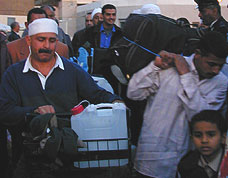 The
luckier ones have brought home jugs filled with water from Zamzam,
the same well that Prophet Abraham's wife Hajar nursed
her son Ismail with. The
luckier ones have brought home jugs filled with water from Zamzam,
the same well that Prophet Abraham's wife Hajar nursed
her son Ismail with.
Some of the waiting
relatives are concerned that the customs process will take a lot of
time. But in fact, it seems to go rather smoothly. "They're only
stopping people with electronic equipment," a returning pilgrim
says. "Otherwise it's fifteen minutes and you're out of
there."
Two elderly
gentlemen are walking out. One of them stops the carriage he is pushing
all of a sudden, causing the other man to bump into him. "You
were bothering me in Mecca, and now you're bothering me here too,"
he says, perhaps only half jokingly.
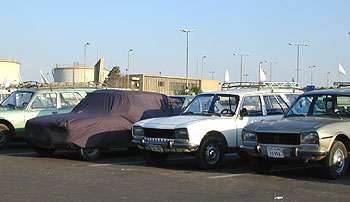 In
the parking lot, bags are piled high on the roofs of 7-seater taxis and
microbuses, most festooned with white flags indicating that the
passengers have just completed the hajj. As the blue sky turns darker,
and a full moon begins to light up the night, the mood is positively
electric with spirituality. In
the parking lot, bags are piled high on the roofs of 7-seater taxis and
microbuses, most festooned with white flags indicating that the
passengers have just completed the hajj. As the blue sky turns darker,
and a full moon begins to light up the night, the mood is positively
electric with spirituality.

Disclaimer
and Terms of Use
© Copyright 1996-2005 cairolive.com. All Rights Reserved
|